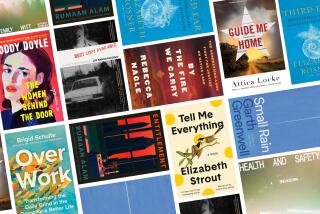Softer versions of Obama, McCain - the paperbacks
- Share via
A weekly column about new or re-released books arriving in bookstores.
--
Just when you thought the presidential race was hitting the summer doldrums, here come the dueling political paperbacks: Random House Inc. is releasing mass market editions of Sen. Barack Obama’s “The Audacity of Hope” (Vintage) and Sen. John McCain’s “Why Courage Matters: The Way to a Braver Life” (Ballantine) on Tuesday. These books, written by the presumptive Democratic and Republican nominees, have radically different messages. But they touch on similar themes of war, terrorism and human character.
Obama’s bestselling title gave many Americans their first glimpse of his views, especially on the Iraq war. Unlike other candidates in his party, he was one of the first to oppose the 2003 U.S. invasion. But the author recently made headlines with comments that he is “refining” his views.
“I believe it is in the best interests of both Americans and Iraqis to begin a phased withdrawal of U.S. troops by the end of 2006,” Obama wrote two years ago. He cautioned, however, that “how quickly a complete withdrawal can be accomplished is a matter of imperfect judgment, based on a series of best guesses . . . “
McCain’s book, written with Marshall Salter, says character and courage can affect history, profiling activists such as civil rights leader John Lewis and Burmese dissident Aung San Suu Kyi.
The author’s military credentials, and his support for the Iraq war, also form his world view: “A kind of madness is how a friend of mine, a Marine Corps veteran of the Vietnam War, described the courage displayed by men whose battlefield heroics had earned them the Medal of Honor,” he writes. “It’s impossible to comprehend, really, even if you witness it. . . .”
The controversy over Iraq and the war on terror dominates “A Path Out of the Desert: A Grand Strategy for America in the Middle East” (Random House) by Kenneth M. Pollack, a leading policy analyst who believes promoting reform in the region is crucial to America’s goals.
Jane Mayer’s “The Dark Side: The Inside Story of How the War on Terror Turned Into a War on American Ideals” (Doubleday) and Peter Hennessy’s “The New Protective State: Government, Intelligence and Terrorism” (Continuum) examine the effect of anti-terrorism policies on civil liberties.
A key flash point of those policies has been the growing Muslim population in western countries, and two new books probe the experiences of youths: “Muslim American Youth: Understanding Hyphenated Identities Through Multiple Methods” by Selcuk Sirin and Michelle Fine (NYU Press) and “Acts of Faith: The Story of an American Muslim, the Struggle for the Soul of a Generation” by Eboo Patel (Beacon Press) highlight the struggles by many young Muslims to maintain their faith and also integrate themselves into society.
Such assimilation can be tough for warriors as well as civilians. Todd Kormarnicki’s new novel “war” (Arcade) tells of a modern soldier who has been wounded and staggers through an unidentified, shattered city. It’s a haunting look at the absurdity of war. The soldier can’t remember who he is, the purpose of his mission or how he got there.
History can be a useful guide at such moments, and the still-raging debate over America’s actions in the Vietnam War may offer insights. Even for children. Two new children’s books by Mary Englar “The Tet Offensive” and “The Fall of Saigon” (Compass Point Books) tell the story of these traumatic episodes in an evenhanded manner, showing both sides of a conflict that continues to provoke intense emotions.
But sometimes a rigorously balanced approach misses the true flavor of human events. That’s what the so-called New Journalists argued as their work appeared in the early 1960s, and a sterling example is Norman Mailer’s newly reissued “Miami and the Siege of Chicago” (New York Review Books).
The late author’s trailblazing accounts of the Republican and Democratic conventions -- 40 summers ago -- are framed against the backdrop of the Vietnam War. At the conclusion, Mailer is exhausted by the conflicts and passions dividing Americans. With an eerie prescience, he writes: “We will be fighting for forty years.”
--
More to Read
Sign up for our Book Club newsletter
Get the latest news, events and more from the Los Angeles Times Book Club, and help us get L.A. reading and talking.
You may occasionally receive promotional content from the Los Angeles Times.








